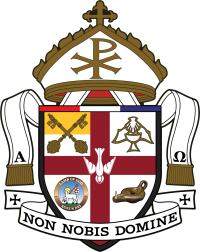Military Chaplaincy in the CEC-NA
Why are Military Chaplains Necessary?
Since the Revolutionary War, chaplains have played a major role in peacekeeping in our Nation. They have always played a part in bringing God’s Word in times of crisis, even to giving their lives to save others.
Over the past few decades, and most recently in the last twenty years, U.S. military chaplains have increasingly played a key role in promoting peaceful resolutions in conflict environments. While their primary mission across the service branches is pastoral care — leading religious services, providing counsel, and offering spiritual guidance, for example — military chaplains have also, at times, served as liaisons and bridge-builders with local religious leaders.

In 1943, four chaplains gave their life jackets to four other Soldiers so that they might survive the German torpedo attack upon their vessel. As the story goes, everyone on board the ship heard them singing, “How Great Thou Art” as the ship was sinking into the sea. Military chaplains provide or perform religious services on behalf of their denominational endorsement to those serving in the military.
Religion matters in every area of operation to varying degrees, and military planners have increasingly recognized over the past two decades how religion contributes to peace and conflict dynamics. Recognized as religious leaders, chaplains, by definition, “get religion.” They are uniquely suited to provide religious advisement in ways diplomats cannot, through peer-to-peer meetings with religious leaders and actors when deployed. Their insights can help their commanders understand how to navigate religious dynamics in an area of operation.
Chaplains, the military’s religious actors, can play an expanded role in understanding those dynamics. In contexts as diverse as Bosnia, Iraq, and Afghanistan, military chaplains have proven they can build trust and establish relationships in areas of conflict, creating entry points into communities that were previously not accessible.
Serving as de facto religious diplomats, there are many examples where chaplains helped their units gain access to local religious leaders by establishing a rapport and even friendship through the common ground of their religious and spiritual identities. In Afghanistan, one chaplain offered to train an Afghan Imam to be a military chaplain — creating a bond of trust between them that would open doors. In Iraq, another chaplain helped bring together Sunni and Shite Muslim leaders to promote violence reduction strategies. Joint trainings between chaplains from many divisions — including through the National Guard State Partnership Program — as well as meetings with chaplains from partner countries, such as an exchange with representatives from several African countries and U.S. states, exhibit the numerous other ways that chaplains have expanded their capacity to engage and advise while at the same time creating an opportunity to build relationships between cultures.
Military chaplains are highly skilled educationally in many areas of academia, such as clinical and practical theology, biblical studies, ethics, preaching/teaching, pastoral care and strategic leadership, and psychology. They are a unique resource that can help commanders understand the religious terrain. Chaplains are used to change and working in chaotic situations. They are command chaplains, chaplain supervisors, therapists, clinical supervisors, hospital chaplains, and ethics professors, yet without denominational endorser support and specialized training in religious engagement and a commitment to proper resourcing such as through the chaplains’ schoolhouse, their immense potential will go untapped — and lessons learned will be lost.
Once these men complete their assigned duties and return to their parishes, they now become subject matter experts to help their denomination grow in specialized and general areas of ministerial support such as parish planting, leadership and administrative support, teachers, professors, counselors, missionaries, and mentors for other clergy seeking vocational guidance.
